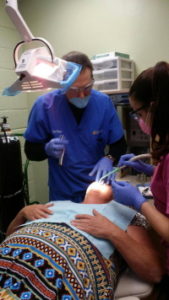Phone: 910-762-3481

Digital x-rays and panoramic x-rays make it more convenient for our dentists to diagnose a broad variety of dental issues, from supporting bone loss to tooth decay, cysts, tooth abscesses, and some kinds of tumors. In the past, dentists had to take several x-rays of a patient’s mouth. Although it was effective at helping our dental professionals identify dental issues, it was a time-consuming process for both the patient and provider.
Then came panoramic x-rays. These allow dental professionals to capture all aspects of your teeth within a single x-ray. Panoramic x-rays rapidly became the “it” word referenced within the dental arena. However, in recent years, a fresh buzzword, digital x-ray, is now making waves within the dental world because of the ingenious imaging option it represents.
Digital X-Rays vs. Panoramic X-Rays
Both digital x-rays and panoramic x-rays are broadly used because they’re a convenient way to assess a person’s dental condition. Panoramic x-rays capture the entirety of the mouth in one picture, from your tooth roots to teeth tips, sinuses and jaws. Compared with other kinds of x-rays, a panoramic x-ray makes it easier for us to see the indications of dental issues such as cysts, infections, fractures, and impacted teeth. But, the angle of the imaging in a panoramic x-ray makes it less efficient at finding cavities.
However, digital x-rays may be as expedient and effective as panoramic x-rays in finding virtually all kinds of dental issues, which includes cavities. A digital x-ray is a kind of two-dimensional imaging which captures images upon a flat electronic sensor or pad which allows the images to be seen on a computer instead of an x-ray film. A digital x-ray permits us to enlarge, zoom in, or enhance the images of the teeth on our computer.
When Should You Choose Either A Digital or Panoramic X-Ray?
The necessity for an x-ray depends upon multiple factors, from your current and previous health condition to any lifestyle habits like smoking. When you enter our offices for a diagnosis, we will ask you a few questions to assist in determining the type of x-ray that is appropriate for your unique circumstances.
For more information on our restorative dentistry services contact Phelps Family Dentistry in Wilmington, NC, today at 910-762-3481.